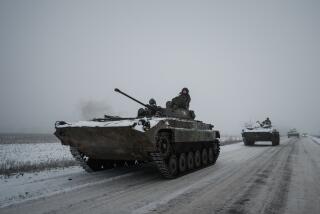Speaking Softly With Russia
- Share via
A U.S. commentator once wrote that diplomacy meant saying “the nastiest things in the nicest way.” Secretary of State Colin L. Powell heeded that aphorism this week with an op-ed article in the influential Russian newspaper Izvestia that blended needed criticism of Moscow with reaffirmations of U.S. friendship.
Powell’s article contained the nuances of good diplomacy; it spoke clearly without shouting. The list of Russian government shortcomings was short and clearly stated. The criticism was a welcome change from the Bush administration’s usual silence on President Vladimir V. Putin’s increasing consolidation of power and Moscow’s harsh actions in Chechnya that terrorize civilians in the hunt for Islamic fundamentalists.
Powell wrote that Russia’s democratic system “seems not yet to have found the essential balance” among the judicial, legislative and executive branches of government -- a pointed yet moderate comment. He noted restraints on political parties and news media. Later, Powell told reporters that he did not intend to interfere in Russian political life but was speaking as one friend to another. Powell said he raised the U.S. concerns in his meeting with Putin; Russian Foreign Minister Igor S. Ivanov minimized the significance of Powell’s comments.
Last month’s parliamentary elections exemplified a woeful backward step toward the Soviet era. The government seized private television networks before the balloting, with the result that the United Russia party, which supports Putin, dominated the airwaves. Europeans monitoring the election said state media support of favored parties caused “overwhelmingly distorted” results and was a “regression” from democracy. To its credit, the Bush administration said it agreed with the European concerns.
To be effective, diplomatic overtures must be carefully calibrated and consistent to minimize misunderstandings. Quiet remonstrances sometimes are more effective than loud denunciations, especially when spoken by the sole remaining superpower.
Soon after taking office, President Bush praised Putin strongly. He said the Russian was “deeply committed to his country” and invited him to his Texas ranch. That kind of support can encourage nations moving toward democracy, but backsliding requires chastisement as well.
More to Read
Sign up for Essential California
The most important California stories and recommendations in your inbox every morning.
You may occasionally receive promotional content from the Los Angeles Times.










